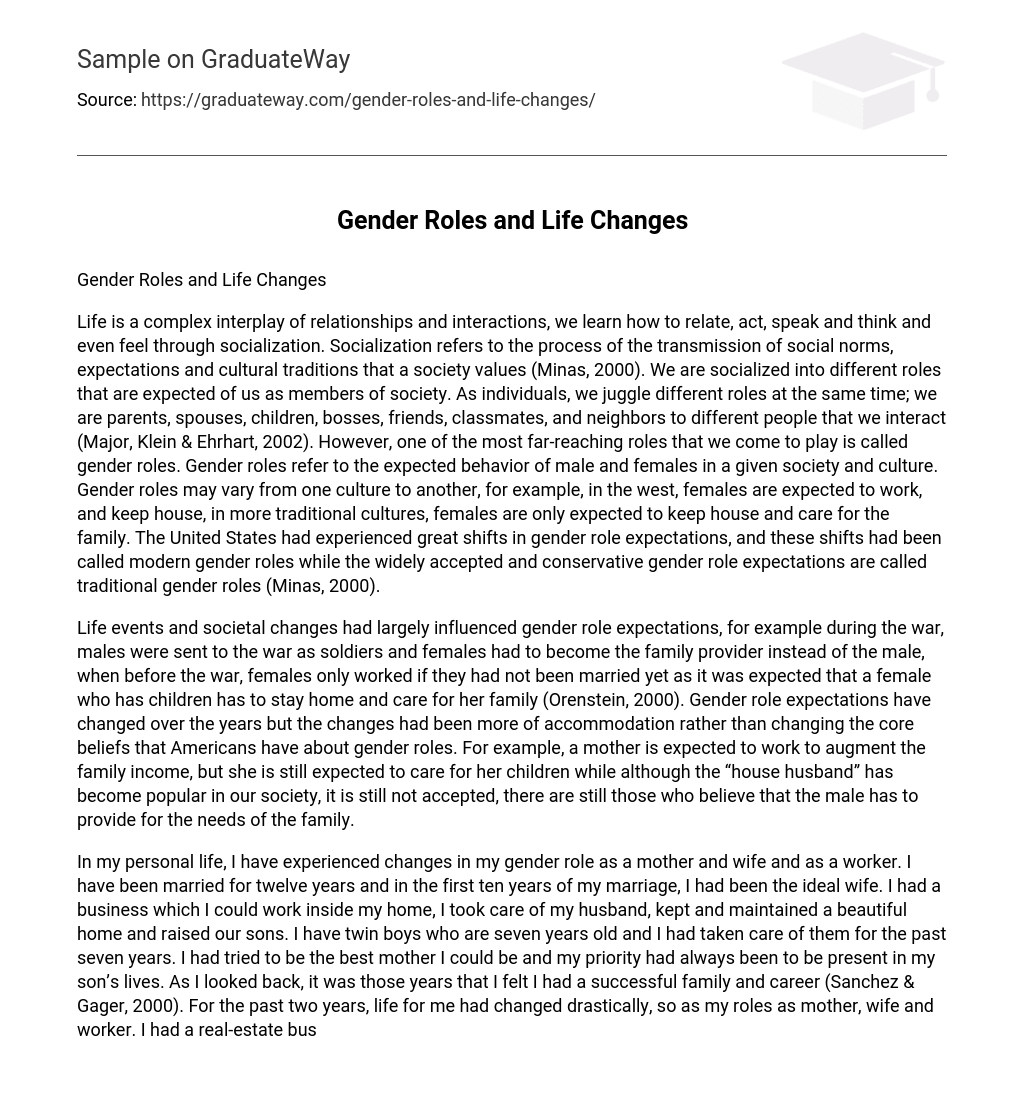Life is a complex interplay of relationships and interactions, we learn how to relate, act, speak and think and even feel through socialization. Socialization refers to the process of the transmission of social norms, expectations and cultural traditions that a society values (Minas, 2000). We are socialized into different roles that are expected of us as members of society. As individuals, we juggle different roles at the same time; we are parents, spouses, children, bosses, friends, classmates, and neighbors to different people that we interact (Major, Klein & Ehrhart, 2002). However, one of the most far-reaching roles that we come to play is called gender roles. Gender roles refer to the expected behavior of male and females in a given society and culture. Gender roles may vary from one culture to another, for example, in the west, females are expected to work, and keep house, in more traditional cultures, females are only expected to keep house and care for the family. The United States had experienced great shifts in gender role expectations, and these shifts had been called modern gender roles while the widely accepted and conservative gender role expectations are called traditional gender roles (Minas, 2000).
Life events and societal changes had largely influenced gender role expectations, for example during the war, males were sent to the war as soldiers and females had to become the family provider instead of the male, when before the war, females only worked if they had not been married yet as it was expected that a female who has children has to stay home and care for her family (Orenstein, 2000). Gender role expectations have changed over the years but the changes had been more of accommodation rather than changing the core beliefs that Americans have about gender roles. For example, a mother is expected to work to augment the family income, but she is still expected to care for her children while although the “house husband” has become popular in our society, it is still not accepted, there are still those who believe that the male has to provide for the needs of the family.
In my personal life, I have experienced changes in my gender role as a mother and wife and as a worker. I have been married for twelve years and in the first ten years of my marriage, I had been the ideal wife. I had a business which I could work inside my home, I took care of my husband, kept and maintained a beautiful home and raised our sons. I have twin boys who are seven years old and I had taken care of them for the past seven years. I had tried to be the best mother I could be and my priority had always been to be present in my son’s lives. As I looked back, it was those years that I felt I had a successful family and career (Sanchez & Gager, 2000). For the past two years, life for me had changed drastically, so as my roles as mother, wife and worker. I had a real-estate business but with the economic decline, I was forced to shut down the business and work in the corporate world. The end of my business had also resulted to several changes in my roles, for one I had to work away from home and my family and I feel that I am not as effective as I used to be as mother to my sons and wife to my husband. In my new job, I had to adjust to the corporate environment and working for a boss, I had been used to being my own boss and it took me sometime to learn how to play the employee role. In my own business, I had no one to compete with and the customers did not care if I had finished a master’s degree, but in the corporate world, I had to contend with a lot of competition especially with male workers (Heilman, Wallen, Fuchs & Tamkings, 2004) and I had to go back to school in order to strengthen my qualifications. Going to school had also affected my roles as mother and wife and as a worker. My husband now does half of the household chores and cares for our sons when I am not home, at the same time, I cannot spend as much time as I want with my sons because I work and study full time. However, I had taken up these new roles because it is the only way for us to survive financially and I think that this is a better decision than having to sell our home and transfer our children to public school.
References
Heilman, M., Wallen, A., Fuchs, D. & Tamkings, M. (2004). Penalties for success: Reactions to
women who succeed at male gender-typed tasks. Journal of Applied Psychology, 89, 416-127.
Major, V., Klein, K. & Ehrhart, M. (2002). Work time, work interference with family, and
psychological distress. Journal of Applied Psychology, 87, 427-436.
Minas, A. (2000) Gender Basics: Feminist Perspectives on Women and Men 2nd ed. Stamford
CT: Wadsworth/Tompson.
Orenstein, P. (2000). Flux: Women on sex, work, kids, love, and life in a half-changed world.
New York: Doubleday.
Sanchez, L. & Gager, C. (2000). Hard living, perceived entitlement to a great marriage, and
marital dissolution. Journal of Marriage and the Family, 62, 708-722.





